|
|
|
Sort Order |
|
|
|
Items / Page
|
|
|
|
|
|
|
| Srl | Item |
| 1 |
ID:
083776


|
|
|
|
|
| Publication |
2008.
|
| Summary/Abstract |
The inter-state system of politics, economics and security is under stress. The well-being and security of states and individuals is eroding as a combination of factors reduces the state's ability to meet its social compact with citizens. Yet over the past decade, Washington has come to assume the effective functioning of the system rather than retaining it as an end of American grand strategy. US policymakers do not fully appreciate how a changing international system is eroding the United States' security and its way of life. The overarching strategic challenge facing the United States is to revitalise the international system so that the nation can conserve its strength and power even as the global environment shifts. It demands a strategy of conservation. It must simultaneously address the chronic weakening of many states and the growing aspiration and activism of others emerging from the ranks of 'middle powers', along with the apparent inability of the current international system to deliver sufficient benefit to those who participate in it.
|
|
|
|
|
|
|
|
|
|
|
|
|
|
|
|
| 2 |
ID:
083779
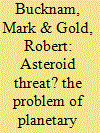

|
|
|
|
|
| Publication |
2008.
|
| Summary/Abstract |
The threat of collision from asteroids and comets calls for a three-step approach to mitigating the risks: first, find and track objects that are potentially hazardous to the Earth; second, study their characteristics so as to understand which mitigation schemes are likely to be effective; and third, test various deflection techniques to ascertain the best way to adjust the orbits of asteroids and comets, and possibly field a planetary-defence system. Each of these steps would benefit from international cooperation or agreement.
|
|
|
|
|
|
|
|
|
|
|
|
|
|
|
|
| 3 |
ID:
083772
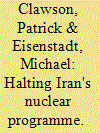

|
|
|
| 4 |
ID:
083774
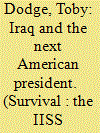

|
|
|
|
|
| Publication |
2008.
|
| Summary/Abstract |
The original justification for the invasion of Iraq, the incompetence displayed in its aftermath, and the high costs of the occupation have undermined the possibility of bipartisan agreement on Iraq. The danger for both US policymakers and the long-suffering Iraqi people is that American politics will continue to shape Iraq policy well beyond the next US presidential election on 4 November 2008. While both candidates have presented starkly different plans for Iraq, those seeking to influence the political and military strategy of the next US president have been held hostage by domestic party concerns. The hazard for the next president is that his Iraq policy will owe much more to bitter and ideologically driven arguments in Washington than the actual situation in Baghdad. In order for the next president to avoid yet another Iraq debacle, both candidates' policies need to be held up against the Iraqi realities they wish to shape
|
|
|
|
|
|
|
|
|
|
|
|
|
|
|
|
| 5 |
ID:
083778
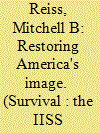

|
|
|
|
|
| Publication |
2008.
|
| Summary/Abstract |
America's image in the world today is not all that it should be. Blame for this is most often assigned to President George W. Bush, but greater responsibility rests with deeper changes in the international system: the resentment (and fear) caused by the preponderance of American power, the loosening of alliances after the demise of the Soviet Union, a fundamental rethinking of the laws of war and peace in an age of terror, the co-branding of the United States with the forces of modernity and globalisation, and a demographic change that has sidelined the post-Second World War generation with their historical memories of American bravery and generosity. The next US president can start to restore America's image by setting a new tone, adroitly managing the US presence in the Persian Gulf and adopting new policies on climate change, immigration, world trade, and Guantanamo Bay. Even so, resurrecting America's image will be a slow, long-term process.
|
|
|
|
|
|
|
|
|
|
|
|
|
|
|
|
| 6 |
ID:
083771
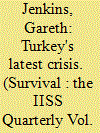

|
|
|
| 7 |
ID:
083775
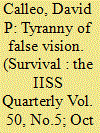

|
|
|
|
|
| Publication |
2008.
|
| Summary/Abstract |
For the past two decades, the American political imagination has been possessed by a hazardous geopolitical vision; the United States is defined as the dominant power in a closely integrated and 'unipolar' international system. A century of history has done much to encourage this view. Americans have trouble realising how revolutionary and threatening their unipolar vision can appear to others. A world system dominated by one superpower is a bold and radical programme. If successful, it would mean, for the first time in modern history, a world without a general balance of power. Pursuing such a goal implies numerous confrontations with other nations. It antagonises both states that fear decline and those that anticipate improvement. Nevertheless, Americans now find it difficult to entertain any other view of the world. They have been slow to see, let alone accept, what to many others seems a more probable and desirable future - a plural world with several centres of power
|
|
|
|
|
|
|
|
|
|
|
|
|
|
|
|
| 8 |
ID:
083773
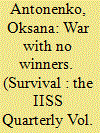

|
|
|
|
|
| Publication |
2008.
|
| Summary/Abstract |
It is difficult to understand what prompted Mikheil Saakashvili to transform the Russian-Georgian cold war into a hot one. The Georgian leader would have been better off rallying a diplomatic coalition to pressure Moscow. His attack, whether provoked or not, has undermined his international credibility. Now some of his allies in the United States and Europe blame him for igniting a crisis which has cost his nation dearly and lowered the threshold for Russian military intervention in Russia's 'near abroad'. The conflict also became a diplomatic confrontation between Russia and the West. In this test of wills, none of the parties - Georgia, Russia or the West - has emerged as a winner. The post-Cold War world order, built on the assumption that Russia and the West could settle all their differences by peaceful means, has been challenged.
|
|
|
|
|
|
|
|
|
|
|
|
|
|
|
|
| 9 |
ID:
083777
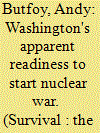

|
|
|
|
|
| Publication |
2008.
|
| Summary/Abstract |
Washington's option for the first-use of nuclear weapons, and its connected stance on 'negative security assurances', is largely based on the idea these weapons serve a wider purpose than deterring nuclear attack. During the Cold War this wider purpose was mostly seen as deterring a Soviet conventional invasion of Western Europe; today, this wider purpose is less clear and less defined or constrained by strategic logic. The idea of 'calculated ambiguity' has been used to explain the situation, but it is inadequate. It fails to capture the way the controversy surrounding the first-use option occupies the intersection of planning for nuclear war, putative US national interests, arms control, contrasting conceptions of world order, and foreigners' perceptions of the United States.
|
|
|
|
|
|
|
|
|
|
|
|
|
|
|
|
|
|
|
|
|